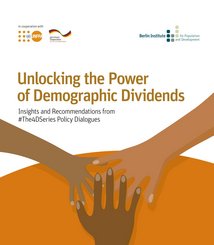
This report highlights the potential of targeted population policies to achieve demographic dividends.
Read more
Until recently, Africa’s economies had been growing consistently. Between 2000 and 2018, African gross domestic product increased by more than four percent per year on average, only surpassed by countries in South and East Asia. However, high economic growth over the last two decades has not been sufficient to keep up with population growth on the continent. Moreover, economic growth has barely translated into the socio-economic progress needed to offer young generations better opportunities and thereby reduce long-term population growth. This discussion paper highlights the main reasons for this and highlights economic opportunities that are likely to arise for Africa if fertility rates decline and a change of the population age structure sets in.
The Berlin Institute would like to thank the Federal Foreign Office for funding the project. The Berlin Institute is solely responsible for the content of the study.
Executive Director
Telefon: +49 30 - 22 32 48 45
Contact via Mail: hinz@berlin-institut.org
© Berlin-Institut
Demographic change is not a disaster, but a challenge. Analyses and concepts are needed to master them successfully. The Berlin Institute for Population and Development provides these free of charge and makes a significant contribution to ensuring that important future issues are discussed on a broad basis and put on the political agenda. The non-profit Berlin Institute works on a non-partisan basis and receives no state funding whatsoever. Your donation therefore helps to maintain our independence and the high standard of our publications. Donations to the Berlin Institute are tax-deductible and can be made directly online using the donation button or by using a bank transfer form to the following account
Donation account
GLS Bank
IBAN DE15 4306 0967 1276 4833 00
BIC/SWIFT GENODEM1GLS
We thank you very much for your support!